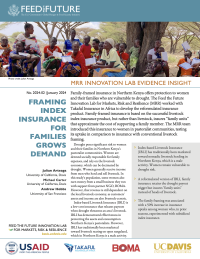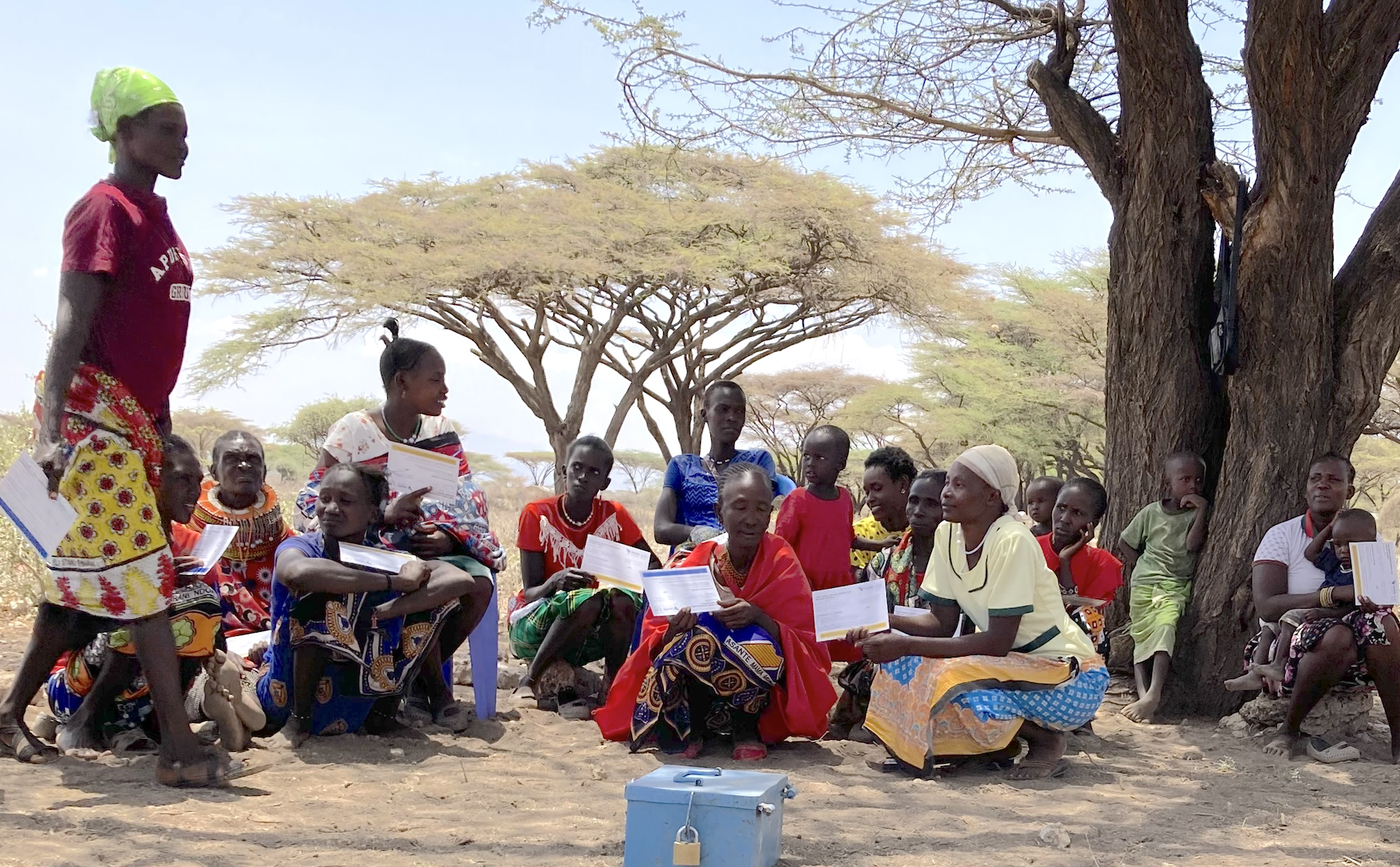Family-framed insurance in Northern Kenya offers protection to women and their families who are vulnerable to drought. The Feed the Future Innovation Lab for Markets, Risk and Resilience (MRR) worked with Takaful Insurance in Africa to develop the reformulated insurance product. Family-framed insurance is based on the successful livestock index insurance product, but rather than livestock, insures “family units” that approximate the cost of supporting a family member. The MRR team introduced this insurance to women in pastoralist communities, testing its uptake in comparison to insurance with conventional livestock framing.
Drought poses significant risk to women and their families in Northern Kenya's pastoralist communities. Women are deemed socially responsible for family expenses, and rely on the livestock economy, which can be decimated by drought. Women generally receive income from men who herd and sell livestock. In this study's population, some women also earn money from a small business they run with support from partner NGO, BOMA. However, that revenue is still dependent on the local livestock economy, as customers' assets and income are also livestock-centric.
Index-based Livestock Insurance (IBLI) is a low-cost insurance that releases payouts when drought threatens an area’s livestock. IBLI has demonstrated effectiveness in protecting the assets and consumption Northern Kenya's pastoralists. However, IBLI has traditionally been marketed toward livestock rearing on open rangeland, which in Northern Kenya is a male activity. The MRR Innovation Lab worked with Takaful Insurance in Africa to re-frame IBLI as a family insurance product with more direct appeal to women.
Framing Family Insurance
Highlights
- Index-based Livestock Insurance (IBLI) has traditionally been marketed toward nomadic livestock herding in Northern Kenya, which is a male activity. Women remain vulnerable to drought risk.
- A reformulated version of IBLI, family insurance retains the drought payout trigger but insures "family units" instead of heads of livestock.
- The family framing was associated with a 50% increase in insurance uptake among women who, in prior seasons, experimented wtih subsidized index insurance.
The family insurance is a reformulation of the IBLI product, which uses satellite data to measure vegetation levels and determine if a drought is threatening livestock. The family-framed policy uses the same index to determine if a payout-triggering drought has occurred.
However, subscribers need not own livestock; instead, the insurance is sold in “family units.” That is, instead of insuring a number of animals, subscribers determine how many household members to insure.
The payout amount for a “family unit” is roughly the per-capita amount of emergency aid that the Government of Kenya offers under its Hunger Safety Net Program. In the event of a payout, the subscriber can use the money for whatever she chooses—food, livestock, school fees, or something else.
Takaful Insurance sees the family framing as consistent with their intention to expand their relevance to women throughout the country.
Testing Family Insurance: Design
The MRR team began studying uptake of the family-framed insurance toward the end of a study across 83 pastoralist communities where BOMA works. Coupons for a discount on insurance premiums during the period 2018-2021 were randomly assigned to half of participating women. The coupons were intended to serve as a "smart subsidy" that encouraged lower-risk experimentation with insurance.
During the final season of the coupon period, half of the communities continued to be offered only the conventionally framed IBLI insurance, while the other half were introduced to the family insurance.
BOMA mentors, who were known to the women, introduced family insurance. Using a comic book to explain the concepts, BOMA mentors emphasized women's risk exposure to drought in terms of both business income and reduced transfers from herding income from their husband.
Family insurance was then offered again in the same communities for an additional season, after the discounts had expired.

Family-Framed Insurance Holds Appeal
The MRR Lab's study found that the family framing increased insurance uptake by approximately 10 percentage points.
In the season following expiration of the subsidy, only households that previously received a coupon purchased insurance, regardless of how the product was framed. These results underscore the value of the opportunity to inexpensively experiment with index insurance through a subsidized premium.
Among households who previously received a coupon, 19% who were offered insurance only under the conventional IBLI framing purchased it. The family framing increased the purchase rate to 29% in the respective communities, a 50% increase over the traditional framing.
Initiatives seeking to protect women's income and assets may do well to consider introducing insurance that is framed for relevance to women, along with smart subsidies to encourage initial uptake.
Scaling Through Savings Groups
In August 2023, family-framed insurance is being offered in 5 counties in Northern Kenya. The Takaful family insurance offering is now a bundle that includes health and accident insurance.
For this expansion, BOMA staff introduce the family insurance to women in their savings groups. The MRR Innovation Lab's Village Insurance Savings Account model enables women to save for an insurance premium by increasing their normal savings amount over a period of time. At approximately $15, the bundle's premium is a higher amount than the targeted women would be able to spend on short notice (i.e., if they learned about the offering at the same time payment was required). However, saving an additional $3 a month is doable for at least some of the women.
The MRR research team is employing a randomized control trial among 430 groups to test the saving model's effectiveness in supporting family insurance uptake among this new population.

